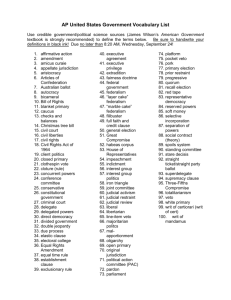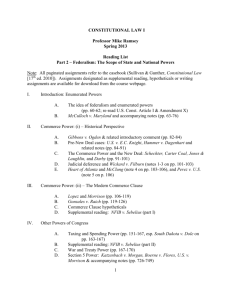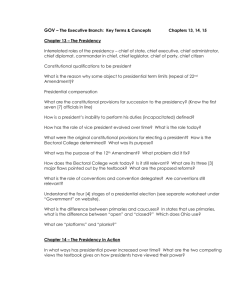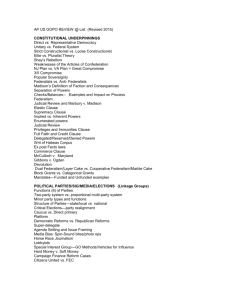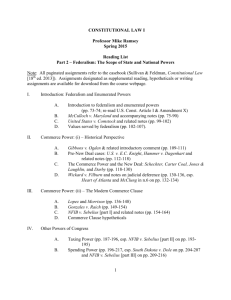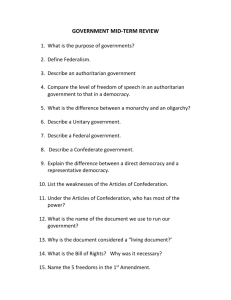CONSTITUTIONAL STRUCTURES OF GOVERNMENT COURSE
advertisement
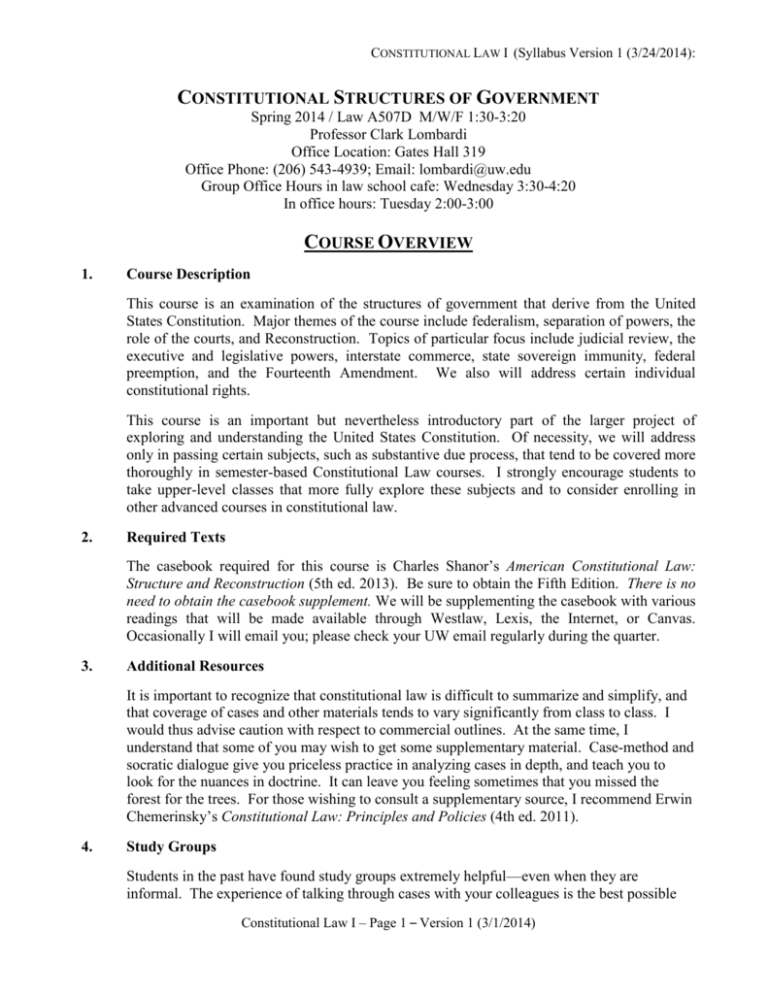
CONSTITUTIONAL LAW I (Syllabus Version 1 (3/24/2014): CONSTITUTIONAL STRUCTURES OF GOVERNMENT Spring 2014 / Law A507D M/W/F 1:30-3:20 Professor Clark Lombardi Office Location: Gates Hall 319 Office Phone: (206) 543-4939; Email: lombardi@uw.edu Group Office Hours in law school cafe: Wednesday 3:30-4:20 In office hours: Tuesday 2:00-3:00 COURSE OVERVIEW 1. Course Description This course is an examination of the structures of government that derive from the United States Constitution. Major themes of the course include federalism, separation of powers, the role of the courts, and Reconstruction. Topics of particular focus include judicial review, the executive and legislative powers, interstate commerce, state sovereign immunity, federal preemption, and the Fourteenth Amendment. We also will address certain individual constitutional rights. This course is an important but nevertheless introductory part of the larger project of exploring and understanding the United States Constitution. Of necessity, we will address only in passing certain subjects, such as substantive due process, that tend to be covered more thoroughly in semester-based Constitutional Law courses. I strongly encourage students to take upper-level classes that more fully explore these subjects and to consider enrolling in other advanced courses in constitutional law. 2. Required Texts The casebook required for this course is Charles Shanor’s American Constitutional Law: Structure and Reconstruction (5th ed. 2013). Be sure to obtain the Fifth Edition. There is no need to obtain the casebook supplement. We will be supplementing the casebook with various readings that will be made available through Westlaw, Lexis, the Internet, or Canvas. Occasionally I will email you; please check your UW email regularly during the quarter. 3. Additional Resources It is important to recognize that constitutional law is difficult to summarize and simplify, and that coverage of cases and other materials tends to vary significantly from class to class. I would thus advise caution with respect to commercial outlines. At the same time, I understand that some of you may wish to get some supplementary material. Case-method and socratic dialogue give you priceless practice in analyzing cases in depth, and teach you to look for the nuances in doctrine. It can leave you feeling sometimes that you missed the forest for the trees. For those wishing to consult a supplementary source, I recommend Erwin Chemerinsky’s Constitutional Law: Principles and Policies (4th ed. 2011). 4. Study Groups Students in the past have found study groups extremely helpful—even when they are informal. The experience of talking through cases with your colleagues is the best possible Constitutional Law I – Page 1 – Version 1 (3/1/2014) way to prepare for a class in which you will be expected to talk through cases in front of you classmates. Regular meetings are also a great way to review material informally and to make sure that you understand how cases you are currently reading connect to other cases. I would urge each of you right at the start of the quarter to form a study group. 5. Office Hours I encourage you to talk with me outside of class if you have questions or comments or otherwise wish to meet. I am always happy to discuss the course and its materials. In addition, I have worked as a clerk at the appellate level, as an associate at a large New York law firm and as a consultant on constitutional and law reform projects around the world. I am happy to discuss any of these experiences with you or more generally to discuss the legal profession. Once a week, I hold group office hours—which are times in which I meet in the law school café and discuss with any students who wish to come by, issues that they want to discuss. Many students find the informal quality of these discussions useful—and they find that they learn as much from listening to their classmates as they do asking their own questions. At times, students have issues that they would like to discuss in a non-group setting. I have an hour of scheduled office hours for this purpose. 6. Disability-Related Needs To request academic accommodations due to a disability, contact Disability Resources for Students (DRS), 448 Schmitz, (206) 543-8924 (V), (206) 543-8925 (TTY). If you have a letter from DRS, please present the letter to me so we can discuss the accommodations you might need in this class. 7. Classroom Policies Preparation. It is critical that you come to class prepared. At a minimum, this requires that you have completed the reading, that you have thought about the implicated issues, and that you arrive to each class ready to discuss the materials on a substantive level. Class Participation. I will call on people randomly and without prior notice, and I encourage students to participate voluntarily. Please note that the purpose of “cold calling” is not to intimidate or otherwise impose on students; to the contrary, it is a means of ensuring that everyone is included in the discussion and thus can benefit both from the insights of peers and from actively engaging with the material. It is important also to remember that learning to handle a cold call is a crucial part of your training. No matter what type of law you practice, you will regularly be “cold called” about legal issues. It is not only appellate litigators who need to demonstrate command of doctrine and caselaw and an ability to think on their feet about the implications of doctrine or about how it would be applied to new circumstances. As a transactional lawyer and as a consultant, you will have to do the same. Clients ask you suddenly to explain the law in a particular area and its implications, and so do counterparties during negotiations. Lawyers are simply expected regularly to grapple with complex issues orally and in public. Attendance. Attendance is important, and it is required. Our School’s policy reads, “[a]t any time after the fifth week of a course . . . , a student who has been determined by the instructor to have attended fewer than 80 percent of the class sessions in any course will be required to Constitutional Law I – Page 2 – Version 1 (3/24/2014) drop the course from his or her registration upon the instructor’s so indicating to the Academic Services Office.” 7. Recordings. Class attendance is mandatory, and you are expected to join study groups. Thus, classes will not be podcast. You are not allowed to make your own video or audio recordings of class sessions. 8. Grades Class participation is worth 10% of your grade. Your grade for the course will be determined primarily by your score on an exam. The exam will be open book and four hours long. You may not bring commercial outlines, treatises, or other commercial resources into the exam. You may bring with you only the following: the required casebook, copies of the required reading, your class notes, any material posted to Canvas, and any outlines you personally have prepared or have worked with a group to prepare. If you use a computer for the exam, you must use Extegrity’s Exam4 software. Those using the Exam4 software may use the setting that permits access to electronic documents stored on a hard drive. 8. Reading Assignments Below find the syllabus and reading assignments for the course. We will tackle an average of approximately one assignment per class period. If necessary, I will circulate a revised version of the Course Overview and Syllabus. Each version of the Course Overview and Syllabus is marked at the bottom of the page. Constitutional Law I – Page 3 – Version 1 (3/24/2014) SYLLABUS (subject to modification) I. Introduction M: 3/31 Assignment 1: II. Judicial Power To Enforce the Constitution W: 4/2 Assignment 2: F: 4/4 Assignment 3: M: 4/7 Assignment 4: III. Sources, Methods, and Mechanics of Judicial Decisions Limits on the Judicial Power (Taught by Professor Manheim) Limits on the Judicial Power ‘ctd. Executive and Legislative Powers W: 4/09 Assignment 5: F: 4/11 Assignment 6: IV. Introduction to the Constitutional Structures of Government Executive Powers Legislative Powers Congress’s Article I Powers and Their Limits M-W: 4/14 - 23 Asgn.7-11: Article I Powers, Including the Commerce Clause Power F: 4/25 Assignment 12: Federalism as a Limit: The Tenth Amendment M: 4/28 Assignment 13: Federalism as a Limit: The Eleventh Amendment Federalism as a Limit on State Power W: 4/30 Assignment 14: VI. Federal Preemption of State Law Judicial Protection of Interstate Commerce F-M 5/02-05 Assgn. 15-16: Dormant Commerce Clause; State Privileges & Immunities; 30 Second Time Out: Where have we been; Where are We Going? Note: During the Week of 5/05, there will be a mandatory session on upper level con-law classes: what is being offered; what they can add to your understanding; why you might want to take them. VII. Introduction to the Reconstruction Amendments W-F: 5/07-09 Asgn. 17-18: Overview; State-Actor Doctrine; Fed. Privileges & Immunities VIII. Equal Protection M: 5/12: Assignment 19: Backround on Due Process; Overview of Equal Protection; Traditional Rational-Basis Review; “Separate But Equal” W: 5/14: Assignment 20: Strict Scrutiny F-M: 5/16-19: Assn 21-22: Int. Scrutiny; Fund. Interests; Non-Trad. Rational-Basis Review IX. Enforcement of the Reconstruction Amendments W: 5/21 Assignment 24: F: 5/23 Assignment 25: X. Framework Applications Reflection and Review M: 5/26: MEMORIAL DAY HOLIDAY: W: 5/28: Assignment 26: Reflection and Review F: 5/30: Assignment 27: Wrap-up M: 6/02: Assignment 28 Review Session for exam 6/04: No Class Constitutional Law I – Page 4 – Version 1 (3/24/2014) READING ASSIGNMENTS (subject to modification) “CB” refers to the required casebook. INTRODUCTION Assignment 1 Introduction to the Constitutional Structures of Government • • • • • • • [For those whose U.S. History is rusty] Timeline of Selected Events in U.S. History (available on Cavas) Russell Baker, “On Conversation”, N.Y. Rev. of Books, 5/11/2006 (available on Canvas) The U.S. Constitution and Amendments (CB pp. xxv-xli) A Brief Outline of the Constitution’s Text (CB 1-3) A Brief History of the Constitution and Its Interpretation (CB 4-9) Overview of the Casebook (CB 16) Introduction (CB 17) Assignment 2 Sources, Methods, and Mechanics of Judicial Decisions [revise] Required: • 7 page Excerpt from Treatise discussing Marbury v. Madison (on Canvas) • 9 Page Excerpt from S. Gardbaum, THE NEW COMMONWEALTH CONSTITUTIONALISM (2013) (On Canvas). • Alex Kozinski “What I Ate for Breakfast”, 26 Loy. L.A. L. Rev. 993 (1993) (on Canvas) • Introduction to Interpretative Issues; Casey; Roper (CB 39-50) • Pierre Leval, Judging under the Constitution: Dicta about Dicta, 81 N.Y.U.L.R. 1249 (2006) (on Canvas) (23 Pages) Strongly Recommended • Interpretative Choices: the Second Amendment; Heller (CB 50-64) Assignment 3 Limits on the Judicial Power: Standing and Mootness • • • • Introduction to Limits on the Judicial Power (CB 64-65) Congressional Limits: McCardle (CB 65-69) The “Case or Controversy” Limit (CB 85-86) Standing and Mootness; Laidlaw (CB 86-98) Assignment 4 Limits on the Judicial Power: Political Questions • Political Questions; Baker and Vieth (CB 102-113) Constitutional Law I – Page 5 – Version 1 (3/24/2014) • Listen to oral argument from the Vieth case, available at http://tinyurl.com/7kvf2hm EXECUTIVE AND LEGISLATIVE POWERS Assignment 5 Introduction to Distribution of National Powers; Executive Powers • • • • • Introduction to the Distribution of National Powers (CB 114-117) The Framework; Youngstown (CB 117-126) Introduction to Executive Powers (CB 126) Domestic Affairs; Clinton v. City of New York (CB 126-135) Foreign Affairs; Curtiss-Wright; Dames & Moore (CB 135-141) Assignment 6 Legislative Powers • • • Introduction to Legislative Authority (CB 160-161) Chadha (CB 161-169) Morrison v. Olson (CB 177-188) CONGRESS’S ARTICLE I POWERS AND THEIR LIMITS Assignment 7 The Necessary and Proper Clause; the Classical View of the Commerce Power • • • • Introduction to Congress’s Article I Powers (CB 207) Basic Framework; McCulloch (CB 207-220) Introduction to the Commerce Clause Power (CB 224) Classical View; Gibbons (CB 225-233) Assignment 8 The Commerce Clause During and After the New Deal • • Wickard (CB 233-237) Heart of Atlanta Motel (CB 238-242) Assignment 9 Modern Scope of the Commerce Clause • • Lopez (CB 243-251) United States v. Morrison (CB 251-256) Assignment 10 Modern Scope of the Commerce Clause, con’t • Raich (CB 256-261) Constitutional Law I – Page 6 – Version 1 (3/24/2014) • NFIB (CB 261-268) Assignment 11 Other Article I Powers • • • • • The Taxing Power (CB 269) NFIB (CB 269-275) The Spending Powers; Dole (CB 276-281) NFIB (CB 281-287) The Treaty and War Powers (CB 288-289) Assignment 12 Federalism as a Limit: The Tenth Amendment • • • • Introduction to Federalism Limits on Article I Powers (CB 289) The Tenth Amendment; Garcia (CB 289-296) New York v. United States (CB 296-304) Printz (CB 304-311) Assignment 13 Federalism as a Limit: The Eleventh Amendment • • • Introduction to the Eleventh Amendment and State Sovereign Immunity (CB 311-312) Seminole Tribe (CB 312-319) Alden (CB 319-325) FEDERALISM AS A LIMIT ON STATE POWER Assignment 14 Federalism as a Limit on State Power (Federal Preemption) • • • • • Introduction to Federalism’s Limits on the States (CB 330) Introduction to Federal Preemption of State Law (CB 351-352) Geier (CB 352-356) Garamendi (CB 356-363) “Supplementary Materials Re: Preemption” (handout will be made available on Canvas) JUDICIAL PROTECTION OF INTERSTATE COMMERCE Assignment 15 The Dormant Commerce Clause • • • • Introduction to Judicial Protection of Interstate Commerce (CB 364-365) Introduction to Origins of the Dormant Commerce Clause; Willson (CB 365-367) Discrimination and Burdens on Commerce; Philadelphia v. New Jersey (CB 367-373) Kassel (CB 377-386) Constitutional Law I – Page 7 – Version 1 (3/24/2014) Assignment 16 The Dormant Commerce Clause, con’t; State Privileges and Immunities • • • • The Market Participant Exception; South-Central Timber (CB 386-392) United Haulers (CB 392-399) Introduction to State Privileges and Immunities (CB 399) Camden (CB 400-406) INTRODUCTION TO THE RECONSTRUCTION AMENDMENTS Assignments 17-18 Introduction to the Reconstruction Amendments; the State-Actor Doctrine; State Privileges and Immunities • • • • • • • • Introduction to Reconstruction of Federal-State Relations (CB 407-408) Introduction to Origins of the Reconstruction Amendments (CB 408) “Overview of Dred Scott” (handout will be made available on Canvas) State Action; The Civil Rights Cases (CB 418-426) Shelley (CB 426-430) Leesville Concrete (CB 430-438) DeShaney (CB 439-445) Federal Privileges and Immunities; Slaughter-House Cases (CB 445-453) EQUAL PROTECTION Assignment 19 Introduction to Equal Protection; Traditional Rational-Basis Review; “Separate But Equal” • • • • • • • “Overview of Substantive Due Process” (handout will be made available on Canvas) Introduction to Equal Protection (CB 593-595) Introduction to Traditional Rational Basis Review (CB 595) Railway Express & Armour (CB 595-603) Beazer (CB 603-607) Introduction to Race and the Equal Protection Clause (CB 607) Plessy (CB 607-612) & Brown (CB 612-617) Assignment 20 • • • • Strict Scrutiny Introduction to Invidious Race Discrimination (CB 617) Strauder (CB 617-619) Yick Wo (CB 619-620)l; Korematsu (CB 621-627); Loving (CB 627-630) Johnson (CB 630-632); Washington (CB 632-637) Constitutional Law I – Page 8 – Version 1 (3/24/2014) Assignment 21 Intermediate Scrutiny; Fundamental Interests; Non-Traditional Rational-Basis Review • • • • • • • Introduction to Gender and Equal Protection (CB 678-679) Craig (CB 679-685) Virginia (CB 685-693) Introduction to Fundamental Interests and the Equal Protection Clause (CB 703) Zablocki (CB 709-713) Introduction to Rational Basis and Hybrid Review (CB 743) Cleburne (CB 743-750) Assignment 22 Reflection and Review ENFORCEMENT OF THE RECONSTRUCTION AMENDMENTS Assignment 23 Framework for Enforcing the Fourteenth Amendment • • • • Introduction to the Power To Enforce the Reconstruction Amendments (CB 779-780) Introduction to Framework; Katzenbach (CB 780-786) City of Boerne (CB 786-793) Excerpts from Heart of Atlanta Motel, 379 U.S. 241 (1964) & United States v. Morrison, 529 U.S. 598 (2000) (on Canvas) Assignment 24 Applications of Congress’s Section 5 Power • • • • Garrett (CB 794-801) Hibbs (CB 801-806) Coleman (CB 806-810) Shelby County (handout will be made available on Canvas) Assignment 25 Wrap-up • Assignment to be announced. Assignment 26 Review for Final Exam • Every student must, by Sunday at noon, send in two questions you have about the material we have studied along with an attempt to answer it as best you can. (Please note, good faith compliance with this will be counted as part of your class participation.) Constitutional Law I – Page 9 – Version 1 (3/24/2014)

